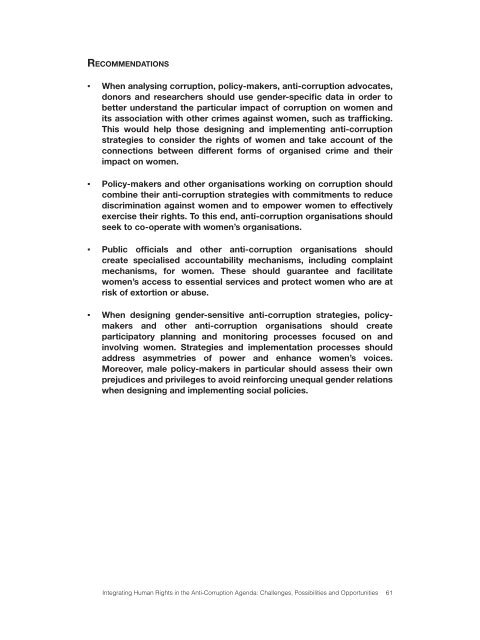Integrating Human Rights in the Anti-Corruption Agenda - The ICHRP
Integrating Human Rights in the Anti-Corruption Agenda - The ICHRP
Integrating Human Rights in the Anti-Corruption Agenda - The ICHRP
You also want an ePaper? Increase the reach of your titles
YUMPU automatically turns print PDFs into web optimized ePapers that Google loves.
Recommendations<br />
▪<br />
▪<br />
▪<br />
▪<br />
When analys<strong>in</strong>g corruption, policy-makers, anti-corruption advocates,<br />
donors and researchers should use gender-specific data <strong>in</strong> order to<br />
better understand <strong>the</strong> particular impact of corruption on women and<br />
its association with o<strong>the</strong>r crimes aga<strong>in</strong>st women, such as traffick<strong>in</strong>g.<br />
This would help those design<strong>in</strong>g and implement<strong>in</strong>g anti-corruption<br />
strategies to consider <strong>the</strong> rights of women and take account of <strong>the</strong><br />
connections between different forms of organised crime and <strong>the</strong>ir<br />
impact on women.<br />
Policy-makers and o<strong>the</strong>r organisations work<strong>in</strong>g on corruption should<br />
comb<strong>in</strong>e <strong>the</strong>ir anti-corruption strategies with commitments to reduce<br />
discrim<strong>in</strong>ation aga<strong>in</strong>st women and to empower women to effectively<br />
exercise <strong>the</strong>ir rights. To this end, anti-corruption organisations should<br />
seek to co-operate with women’s organisations.<br />
Public officials and o<strong>the</strong>r anti-corruption organisations should<br />
create specialised accountability mechanisms, <strong>in</strong>clud<strong>in</strong>g compla<strong>in</strong>t<br />
mechanisms, for women. <strong>The</strong>se should guarantee and facilitate<br />
women’s access to essential services and protect women who are at<br />
risk of extortion or abuse.<br />
When design<strong>in</strong>g gender-sensitive anti-corruption strategies, policymakers<br />
and o<strong>the</strong>r anti-corruption organisations should create<br />
participatory plann<strong>in</strong>g and monitor<strong>in</strong>g processes focused on and<br />
<strong>in</strong>volv<strong>in</strong>g women. Strategies and implementation processes should<br />
address asymmetries of power and enhance women’s voices.<br />
Moreover, male policy-makers <strong>in</strong> particular should assess <strong>the</strong>ir own<br />
prejudices and privileges to avoid re<strong>in</strong>forc<strong>in</strong>g unequal gender relations<br />
when design<strong>in</strong>g and implement<strong>in</strong>g social policies.<br />
<strong>Integrat<strong>in</strong>g</strong> <strong>Human</strong> <strong>Rights</strong> <strong>in</strong> <strong>the</strong> <strong>Anti</strong>-<strong>Corruption</strong> <strong>Agenda</strong>: Challenges, Possibilities and Opportunities 61

















